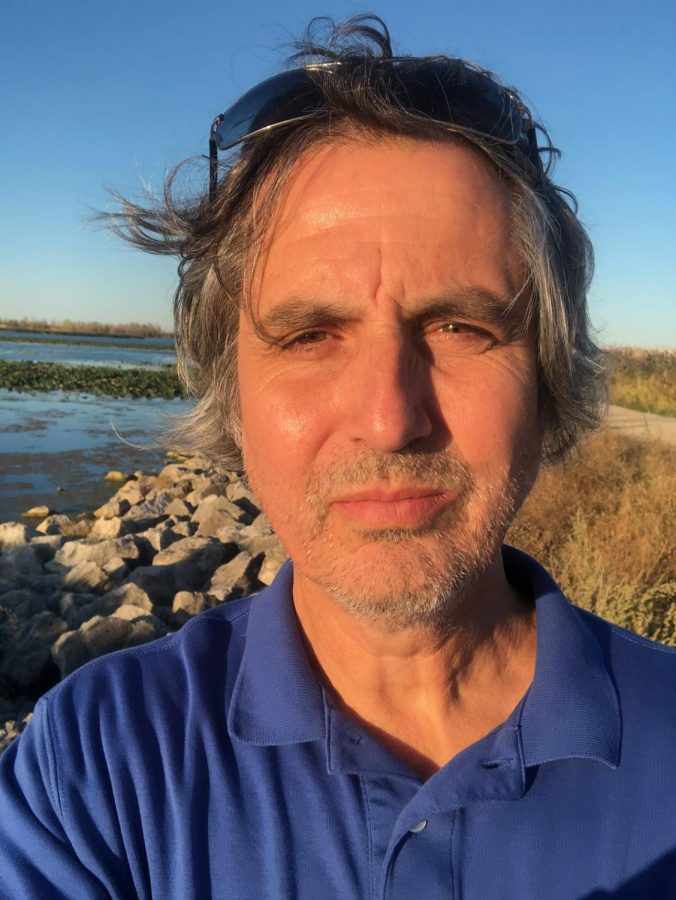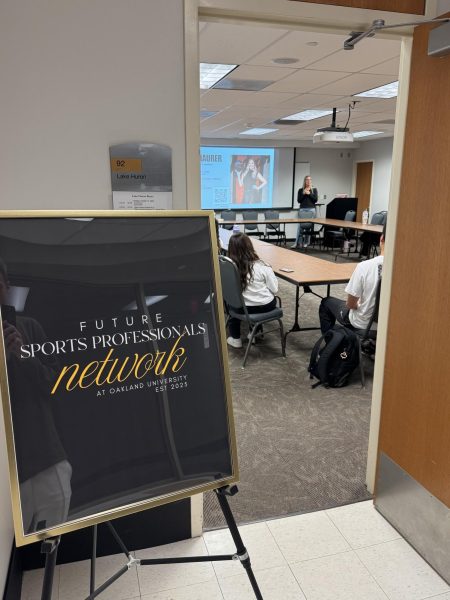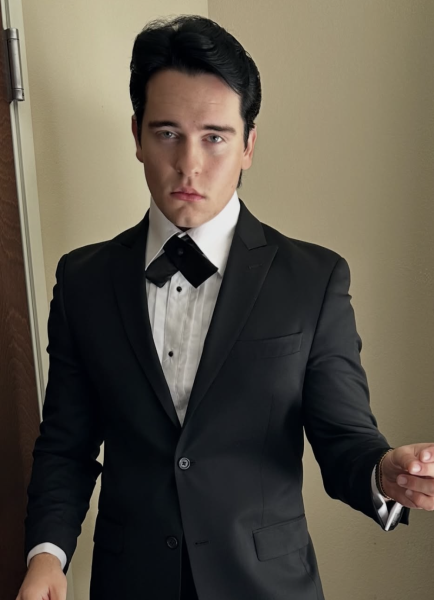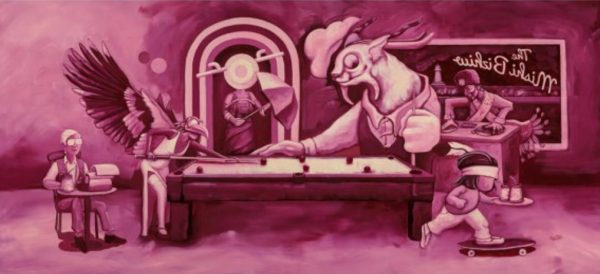Professor Peter Markus talks love, grief, family in new collection of poetry
Photo courtesy of Peter Markus
OU Creative Writing Professor Peter Markus. His new book “When Our Fathers Return to Us as Birds” details the death and dying of his father.
Creative Writing Professor and award winning author Peter Markus has released his first collection of poetry titled “When Our Fathers Return to Us as Birds.” The new book, published by Wayne State University Press as part of their “Made in Michigan Writer Series,” chronicles Markus’ experience caring for his dying father.
A story spanning over 90 different poems, in these pages Markus takes profound elements of humanity — our ability to love and care for each other, our mortality, pain, grief — pulls them out of the air and sets them down on the bank of the Detroit River for all to behold.
Reminiscent of Jack Gilbert, Marie Howe and Sharon Olds — with this collection, Markus brings the reader in and walks them through some of the darkest moments of his life. In doing so, he shines a light that both the living and the dead can see. This is our interview.
Jeff Thomas: So this book obviously revolves around the death and dying of your father. I’d like to start off with the time frame of this collection. When did you begin working on these poems? Was it before or after your father passed away? Were you documenting the experience of losing him through writing while it was happening, or did these poems come to you in response to the loss?
Peter Markus: My father’s health took a turn for the worse six years ago, in 2015, when he ended up losing the ability to walk and was bedridden for the final three years of his life. It was hard to see this, as you might imagine, and so one thing I started doing, as a way of honoring my father’s life and as a way of taking something from it—some life-lessons you might even say—I got in the habit—call it a ritual even—of waking up at five in the morning which is what my father did as far back as I can remember. Every morning I began my day by reading poetry and shortly thereafter my own poems started coming to me through the dark and in conversation with these other poets. As Theodore Roethke says, “In a dark time, the eye begins to see.” I kept up with this habit of rising early to read and write and my father’s death did not stop this. If anything, after he was gone, I found that I had now even more to say.
JT: As an author you’re known primarily for fiction like “We Make Mud” and “Bob, or Man on Boat.” What made poetry the right form for you to document and illuminate the experience of losing your father?
PM: It wasn’t a choice, or maybe it was in that I was choosing to read poetry as opposed to reading fiction. But I think there’s more to it than that. I woke up each day, not only to the morning dark, but to this sentence that was constantly in my head: My father is dying in a house across the river. Or maybe: In a house across the river my father is dying. Or maybe this: Across the river my father is dying in a house. There’s always some other way to say it, but it ends up being the same thing. I couldn’t escape what was happening to my father. My father couldn’t get up and walk away. I could have walked away, or turned away, but I chose to be present in his life and in his death and to look closer and to look closely at what was taking place, not only to him but also to me through him and to the world even beyond this dark house. To make something up about it? That was out of the question. To invent something, to project a fiction onto what was going on, no way, no how, I wasn’t at all interested in choosing that device. I had to tell the truth and poetry was the way to do it. It’s like I tell my students all the time, to borrow from the poem by Raymond Carver: “Make use of the things around you… Put it all in.” Or to say it another way through a poem by Mary Oliver: “Pay attention./ Be astonished./ Tell about it.” And so I “made use” of what I saw and heard and felt taking place all around me. I paid attention. I looked, I listened, I felt. I wrote it all down as best I could. Once I got started I couldn’t stop. Which is what you always hope for as a writer. Or as my poet pal Russell Thorburn told me, “This is the book you’ve been waiting your whole life to write.”
JT: For a work as significant as this collection, which chronicles a profoundly personal and difficult experience, what did the style shift from fiction to poetry mean to you as an author? Was it challenging? Do you see this shift to poetry as a natural progression of where you’re at as an author?
PM: The shift in form or genre happened naturally and the only challenge was me seeing myself as a “poet” though for years people have called me, to quote one reviewer of my fiction, “a prose stylist with the ear of a poet.” When you break any book down, for me, it’s all just pages, it’s all just sentences, it’s all just words on the page, though in this new book I paid less attention to language and me just messing around or making stuff up and more to telling the truth in a way that was or is, hopefully, accessible to the reader. When I write fiction, or used to write fiction, I was the only reader I wrote for.
JT: As a whole, this collection is grounded in repetition of the tangible. Wonderful nouns. Birds obviously, but river, water, fish, trees, dogs, morning, sky, ice, snow, the steel mill — all sorts of these sensational elements. What was it about taking the experience of grieving, which can be very heady, internal, spiritual, etc., and attaching it to the physical world around you that was so necessary for telling the stories in this collection?
PM: Nouns are good food. I think I wrote an essay once that took those words as its title. I’m all about taking ordinary things, or nouns, and turning them into “luminous things,” which anyone who’s ever taken a class with me knows that that’s a thing that I talk about often. Finding those things, those words, or to borrow from Rilke’s “Ninth Duino Elegy”:
“Perhaps we are here in order to say: house,
bridge, fountain, gate, pitcher, fruit-tree, window –
at most: column, tower… But to say them, you must understand,
oh to say them more intensely than the Things themselves
ever dreamed of existing.”
I’m all about grounding, in this case, grief or love or suffering or the spiritual even through the ordinary language of this place that I call home and this place that I write about: the river, the mill, the fish, the trees, the birds, etc. Or what I hear myself say often to students: that the way to the universal is through the particulars of your own experience. I experienced my father and his death and my love for him through these words, all nouns: river, house, birds, among any number of others.
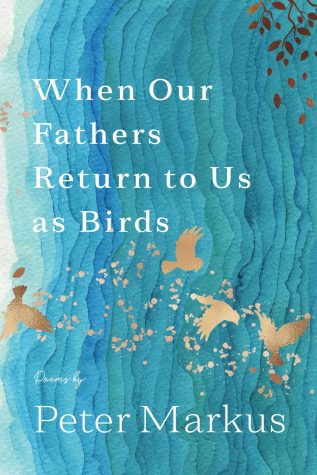
JT: In past works like “We Make Mud”, you’ve heavily fixated on familial words like father, mother and brother. Characters you’ve written have embodied those roles and sort of transcended beyond the meaning that we associate with those words. How has your perception of the meaning of words like father, mother, brother, son changed after experiencing the loss of your father and going through this process of writing about it?
PM: How can a word such as father or mother or brother or son NOT be charged with meaning? But also this: how to move beyond “my father” to make it be, as the title of this book says, “Our Fathers.” That’s what I am hoping takes place when a reader, a stranger to me, takes this book up into their hands and finds meaning in its pages. In the end, I’m not sure my relationship to such words has changed, but certainly these words are charged words and when I say charged I’m hoping that my relation to them has a kind of quiet heft, while at the same time a kind of high voltage to them as well. There’s something contradictory about that, which makes me like it that much more. Do I contradict myself? asks Whitman. Very well then. I contradict myself. I am large. I contain multitudes. Here again, more words that I find myself always bringing into the classroom.
JT: Certainly there’s some humor and moments of levity in these pages, but overall this collection is concerned with heavy topics like death and grieving. One poem that sticks out as going against that grain is “On My Daughter’s Twenty-Third Birthday.” Why was this poem, which is kind of a retrospective about your life and arriving at a certain moment as a father in your own right, important to include in this collection about the death and dying of your father?
PM: That poem is important to me because of who it’s about—my daughter—and the fact that she is the one who made me more than a son, more than a brother, more than a husband, but a father now and most importantly. I’d go even beyond that to say that becoming a father, having a daughter, when I did, taught me how to be a writer, or that in the very least it changed my relationship to language and to fiction and to the way that perception and the way we see the world is ultimately a creative act. I relearned the power of the alphabet alongside my daughter saying her ABCs. That was over 25 years ago, I must say, but the lessons learned remain the same. Language, in short, shapes experience.
JT: What did you learn about your father while writing these poems? Did the process of writing this book inform or alter your view of the relationship you two had? If so, how?
PM: What I learned about my father is that he was just a man too. That he was made of flesh and muscle and bone, and in the end more flesh and bone than muscle. But that he had a heart inside him that wanted to keep living, until of course the betrayals of the body and time finally won out. But he was a good man, which I always knew. When you see someone dying and in such a vulnerable state where they need you to take care of some very basic things—the way the smallest of children need their parents to survive, the way I once needed my father and mother—things break down to the most basic elements of what it means to live and die, to eat and to breathe, or not. I think these poems speak to that better than I can in this conversation. Poetry breaks the experience down to its essentials and doesn’t break down or weaken in the face of such truths. Brother, you can quote me here on that.
JT: You made a point to be present during and witness firsthand tremendously difficult moments at the end of your father’s life. With this collection you’ve documented and in a sense immortalized an experience that a lot of people would choose to look away from or even block out entirely from their life. What motivated you to document this experience? What do you think we gain when we choose not to look away?
PM: I think our most potent material, as writers, comes from those experiences that we might want to turn away from. I think it was Tolstoy, or Gordon Lish, who said that art, or maybe the best art, issues forth from “the wound.” When I was a kid, I was in a pre-industrial, post-punk band growing up called Grief Factory, if you can imagine such a thing, and the sounds we made as Grief Factory speak to this name. In the end, poetry and music and song, it’s all there to help us get through the day, to help us make sense, to give us something tangible to even hold. When I hold this book that bears my name on its spine, a name that is also my father’s name and also is the name of my son, I am holding a piece of my father. Or what Whitman says might also be true:
“Camerado, this is no book,
Who touches this touches a man,
(Is it night? are we here together alone?)
It is I you hold and who holds you,
I spring from the pages into your arms—decease calls me forth.”



